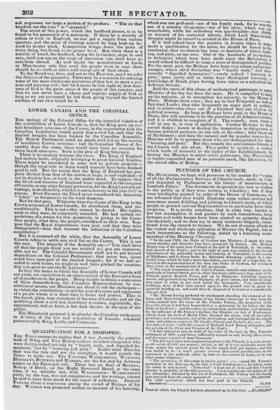QUALIFICATION FOR A BISHOPRIC.
THE Times assures its readers that it was formerly the practice both of Whig and Tory Bishop-makers to select clergymen who were distinguished not only by " li,tr,ily rank, and dignified de- meanour," but by " learning and piety? Under what Ministry that was the rule and not the exception, it would puzzle the Times to make out. Time TAYLORS, W ARBURTONS, WATSONS, HORSLEYS, BUTLERS, and Maisees, are the few and far between names on the Episcopal roll. There was an Earl of BRISTOL, Bishop of Derry, on the Right Reverend Bench at the same time, if we mistake not, with WARBURTON : WARBURTON'S piety, by the way, was not conspicuous, and his writings cannot be said to have done much for the cause of orthodoxy. JEREMY TAYLOR shone ci nspicuous umong the crowd of Bishops of his day. I'VassoN was promoted neither on account of -his learning, which was not profound—nor of his family. rank, for he was the SOH of a country clergyman—nor of his piety, which was not remarkable, while his orthodoxy was questionable—but chiefly on account of his oratorical talents, which Lord SaeLneeen thought might be turned to account in the House of Peers.
If it had indeed been the practice in former times to make merit a qualification for the mitre, we should be forced to the
conclusion, that no church has been so destitute of talent, learn.
ing, and piety, as our own. Out of the hundreds of promotions to bishoprics which have been made since the Revolution, it
would indeed be difficult to name a score of distinguished prelates. For the most part, the Bishops have been very commonplace pee sonages, whose chief distinction was " family rank," and ma.
sionally " dignified demeanour,"—rarely indeed " learning or piety," more rarely still in latter days theological learning; a knowledge of Greek plays having been taken as a substitute for deficient divinity.
And the cause of this abuse of ecclesiastical patronage in every Minister of the day has been the same. He is compelled to keep up his majority, or to strengthen his minority, in the House of Peers. Bishops have votes ; they are in fact Temporal as well as Spiritual Lords ; they take frequently an eager part in polities; and in ninety-nine cases out of a hundred they are chosen for political reasons. As long as Bishops have seats in the House of Peers, this will continue to be the practice of all Administrations; and it is childish to complain of it. The remedy, were there a w ill to use it, is easy of application. Confine Bishops to their sacred duties ; lessen or destroy the temptation to clergymen to become political partisans on one side or the other ; take them out of Parliament ; and then the natural and the popular course for a Minister will be to promote those who are distinguished fin- their " learning and piety." But this remedy the ostentatious friends of the Church will not adopt. They prefer to maintain a system which tends of necessity to the injury of the Establishment, by forcing the Minister to select active politicians, like Pnineosrs, or highly-connected men of no personal mark, like Dzsttsces, for the sacred office of Bishop.


























 Previous page
Previous page